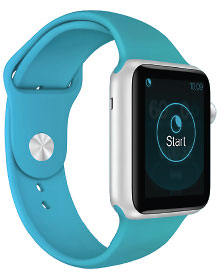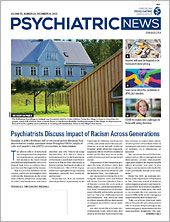In November, the Food and Drug Administration (FDA) cleared NightWare—a smartwatch-utilizing program that can reduce the occurrence of wake-inducing nightmares—to be marketed in the United States as a prescription digital therapeutic. The new system is indicated to treat nightmare disorder or severe nightmares related to posttraumatic stress disorder (PTSD) in adults aged 22 and over.
The clearance of this prescription wearable marks another milestone for the field of digital mental health, while also bringing to market the first treatment for disordered nightmares. NightWare is not a standalone therapy; it should be used as part of a multicomponent treatment plan.
Studies suggest that about 4% of Americans may suffer from clinically significant nightmares, which contribute to sleep deprivation, fatigue, alcohol/substance use, and even suicidal ideation. Such nightmares are especially prevalent in people who experience trauma, and it is estimated that about 70% to 80% of people with PTSD have co-occurring nightmares. Common treatments for people with nightmares often include psychotherapy and/or off-label use of antipsychotics or sedatives.
NightWare uses software installed on an Apple Watch to monitor a person’s heart rate and body movement while sleeping. The software can learn a person’s regular sleep biometrics and can detect when a nightmare is occurring. When the app detects the onset of a nightmare, the watch vibrates just enough to shift the wearer from the dream state (REM sleep) into a non-dream state of sleep.
Patients who are prescribed NightWare receive both the Apple Watch and a linked iPhone with the software preloaded; the phone is locked such that the user cannot add any additional apps.
“We didn’t want to make the software downloadable on someone’s personal device because many people are in the habit of using their phones during the day and then charging them at night,” said Grady Hannah, CEO of NightWare. “The goal is to treat this kit as its own medical device that people get in the habit of putting on every evening.”
NightWare received a breakthrough device designation from the FDA in May 2019 following promising results from an open-label study involving 20 veterans with PTSD. Breakthrough status allows drugs and devices to go through an expedited FDA review process; it is given to products that may treat severe conditions that have no approved remedies.
Last month’s clearance was based on data from 70 patients receiving care at the Minneapolis Veterans Affairs Health Care System. In this randomized, controlled trial, all the participants received the NightWare kit but only the portion in the active arm received vibrations when nightmares were detected.
After 30 days, participants in the active arm reported improvements in their overall sleep quality of 3.2 points, as measured with the Pittsburgh Sleep Quality Index (PSQI), compared with 2.2 points among patients in the sham treatment arm (a three-point improvement in the PSQI is considered a clinically relevant change in symptoms). The participants in the active arm also reported improvements on the PSQI-A (an addendum to the PSQI that looks specifically at PTSD-related nocturnal symptoms such as hot flashes or memories of bad dreams) by 3.3 points compared with 1.4 points in the sham arm. The devices also passed safety measures, as they did not reduce sleep quality or trigger any suicidal ideation.
The 70 patients were the first wave of a planned enrollment of 240 patients. “One of the expedited processes for breakthrough devices is you can submit preliminary data for clearance so long as you promise to complete the trial,” Hannah said. “I thought our data looked promising, and we made our case.”
Peter Colvonen, Ph.D., an assistant clinical professor of psychiatry at the University of California, San Diego, and a clinical psychologist at the San Diego VA said the clearance of NightWare shows the continued progress of digital mental health technologies. But he noted that the app’s goal of interrupting REM sleep may not be right for everyone.
“While there are no approved nightmare medications, we do have behavioral treatments that are incredibly effective,” he said. “The goal of behavioral therapy is not to interrupt nightmares, but to enable patients to process their nightmares and get over the trauma causing them.”
Colvonen noted that REM sleep is tied to emotion processing, which explains why people who have poor sleep become more irritated and emotionally reactive. Interrupted sleep also leads to REM rebound, in which people enter REM sleep sooner and stay in that state longer once they are able to sleep. Thus, a person who forgets to put on the watch after several days of use might be at risk of intense dreams.
“If someone is waking up three or four times a night dripping in sweat because of terrible nightmares, then this device could certainly be part of a therapeutic regimen,” he said. “For less severe cases, it may not be necessary.”
Since the existing trial of NightWare is being conducted at a VA center, Hannah and his team are working to ensure the device is available through the VA. The company is also exploring the possibility of submitting NightWare for Medicare Coverage of Innovative Technology, a new initiative in which cleared breakthrough devices are covered by Medicare for four years. ■
More information on NightWare is posted
here.


